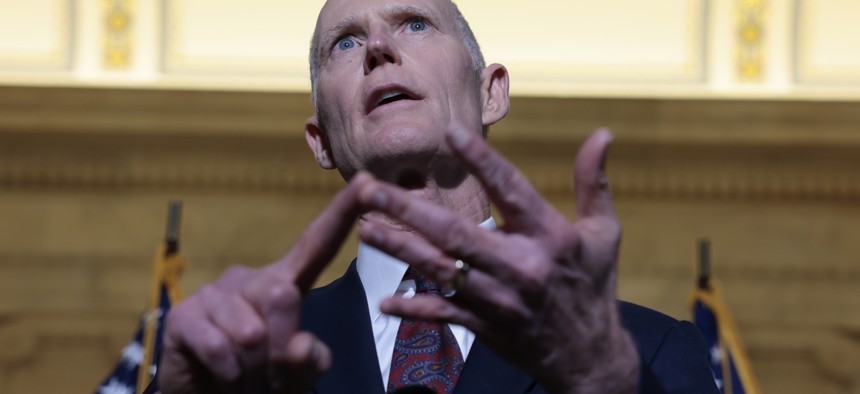
Anna Moneymaker/Getty Images
GOP Will Slash Federal Workforce and Limit Service Time if It Retakes Congress, Senator Says
In his "Rescue America" plan, Sen. Rick Scott proposes that the new majority push for reducing the workforce by 25%, 12-year term limits and new pay caps.
A Republican majority in the Senate could in 2023 push to eliminate one-quarter of the federal workforce and cap the pay and tenure of civil servants, one of the top senators in the caucus said in unveiling a series of policy proposals on Tuesday.
Sen. Rick Scott, R-Fla., issued his “Rescue America” plan to preview what the new majority party might push for if Republicans win back control of Congress in the midterm elections later this year. As part of the 11-point plan, Scott said he and his colleagues would set 12-year term limits on all “government bureaucrats,” with exceptions only when required by national security interests. Members of Congress would face the same restrictions.
“The permanent ruling class in Washington is bankrupting us with inflation and debt, so they must be removed,” Scott said.
The senator pledged to push most federal agencies out of Washington and sell off “nonessential” government assets, buildings and land. Federal employee pay would be capped at five times the median individual income in the United States, or around $179,000 as of 2020. That represents a higher salary than anyone on the General Schedule, but would lower pay for many employees—about 63,000—on other pay scales.
Scott serves as chairman of the National Republican Senatorial Committee, but said his blueprint was not developed as a product of that organization. The Republican party has not otherwise released its governing plan, should it retake the majority.
“The American people are very likely to put Republicans in control of the Senate and House in 2022,” Scott said. “But then, what? If Republicans return to Washington’s business as usual, if we have no bigger plan than to be a speed bump on the road to America’s collapse, we don’t deserve to govern.”
The senator also said he would lead the charge to slash 25% of the federal workforce within five years. The Internal Revenue Service, where management has for years bemoaned the drastic staff cuts it has endured, would see its rolls cut in half. Scott did not detail whether lawmakers would force agencies to begin laying off employees or simply rely on attrition, but noted they would shift significantly more responsibilities to the private sector. He added that Republicans will “eliminate truly non-essential government employee positions, because they are non-essential.”
Scott vowed to ensure federal retirement dollars, such as those in the Thrift Savings Plan, are not overseen by “woke fund managers and companies that put left-wing politics ahead of profits.” He previously pushed to ban TSP from investing in Chinese companies.
While Scott unveiled the plan as a blueprint for how a Republican majority would govern, it does not have signoff from the rest of the caucus. And even if his colleagues supported the initiatives and they could clear Congress, President Biden would likely veto them.
The senator recently disrupted efforts to reform federal operations when he blocked the Senate from quickly approving a landmark bill to overhaul the U.S. Postal Service. Scott said he was concerned the measure had not gone through the committee process on the Senate side and about the funding for a potential increase in Medicare costs. The Congressional Budget Office said in a recent score the measure would save the government $1.5 billion over the next 10 years. Lawmakers have estimated it will save the Postal Service $50 billion over the same period. Congress is still expected to send the bill to President Biden’s desk in the coming weeks.







